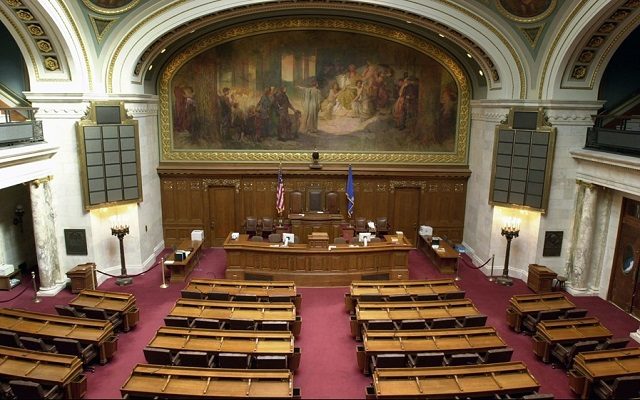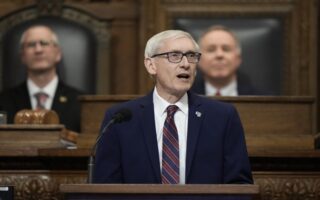Wisconsin Dems’ good night includes blocking supermajorities

By TODD RICHMOND Associated Press
MADISON, Wis. (AP) — Wisconsin Democrats scored a major victory in Tuesday’s election when they staved off Republican hopes to win supermajorities that would have allowed them to legislate without fear of vetoes by a Democratic governor.
The Democrats remain a feeble minority in heavily gerrymandered Wisconsin. But they just managed to retain enough seats to prevent Republicans from the two-thirds majorities that could have overridden the vetoes that Gov. Tony Evers used frequently in his first term.
Republicans needed to flip five Assembly seats and one in the Senate. They got the Senate seat when Romaine Quinn defeated Kelly Westlund for an open seat in far northwestern Wisconsin.
But Democrats defended three of the six seats Republicans had targeted in the Assembly.
Rep. Katrina Shankland held off Scott Spoik for her central Wisconsin seat. Oshkosh Mayor Lori Palmeri defeated Donnie Herman for an open seat representing that city. And Democratic Rep. Steve Doyle defeated Ryan Huebsch to retain his seat representing La Crosse County in west-central Wisconsin.
Republicans flipped the other three Assembly seats they had targeted — two in northern Wisconsin and one in Brookfield. All three seats were open.
The bottom line: Republicans flipped only three of the five seats they needed.
Evers vetoed nearly 150 GOP bills during his first term. With enough votes to override Evers, the GOP could have dramatically reworked state politics over the next two-year legislative session — including reshaping election administration to their advantage in a key battleground state.
They also could have revised the law to clarify that Wisconsin’s 173-year-old abortion ban is indeed in effect after the U.S. Supreme Court this past summer invalidated Roe vs. Wade, the landmark decision that essentially legalized abortion across the country. Democrats say the ban is so old it’s unenforceable.
They would have been able to write the next state budget to their liking, shifting dollars to conservative priorities like voucher schools and advancing tax cuts. They could expand the right to carry concealed weapons and impose more restrictions on unemployment benefits as well as the government’s ability to respond to COVID-19.
In a midterm expected to favor Republicans, Assembly Speaker Robin Vos said most of the targeted seats favored Democrats. But he also credited Evers’ campaign for energizing voters.
“In a good year we could have won one or many of (the targeted seats),” Vos said. “But with the amount of money Tony Evers spent, basically outspending (Republican gubernatorial candidate) Tim Michels two-to-one, they spent of a lot that effort revving up people in blue cities. That’s why our effort fell short.”
Evers outspent Michels $36.9 million to $24.5 million this year, according to campaign finance reports.
Assembly Minority Leader Greta Neubauer said she was pleased with the outcome, especially given the disadvantages Democrats face in Republican-drawn districts that spread out Democratic voters. She said the U.S. Supreme Court’s decision this summer to overturn Roe v. Wade, the landmark 1973 decision that legalized abortion across the country, drove people to vote.
“When 50% of the population loses a concrete right it motivates them to show up to the polls and make their voices heard,” Neubauer said. “It’s really clear from the elections last night that Wisconsinites are not happy with the direction Republicans have been trying to take this state.”






